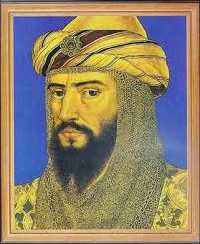 SKC Films Library |
| SKC Films Library >> General and Old World History >> Arab World (General) |
| Saladin [sal' uh dihn] greatest Muslim warrior of the 1100's
Salah al-Din Yusuf was born into a prominent Kurdish family in the castle of Tekrit on the Tigris River in 1138. At the age of 14 he joined other members of his family (the Ayyubids) in the service of Nur al-Din, the ruler of Syria. Between 1164 and 1169 he distinguished himself in three expeditions sent by Nur al-Din to aid the Fatimid rulers of Egypt against attacks by the Christian Crusaders based in Palestine. In 1169 he was made commander in chief of the Syrian army and vizier (head) of Egypt. Although nominally subject to the authority of the caliph of Egypt, Saladin treated Egypt as an Ayyubid power base. In addition to revitalizing Egypt's economy, reorganizing its land and naval forces, and repelling the Crusaders and launching an offensive against them, he also converted the caliphate to Sunnism. In 1171 he suppressed the dissident Fatimid regime and was subsequently recognized as Sultan of Egypt. After Nur al-Din's death in 1174, Saladin used Egypt's wealth for the conquest of Damascus. By 1186 almost all of northern Mesopotamia was under his control, and he was then ready to move against the Crusaders. On July 4, 1187, Saladin defeated a Crusader army south of the Horns of Hattin in Palestine. Guy, King of Jerusalem, was captured during the battle, as were hundreds of Knights Templar. Following this victory, Saladin moved rapidly against as many of the weak Christian centers as possible, offering generous terms if they would surrender, while at the same time avoiding long sieges. This policy had the benefit of leading to the rapid conquest of almost every crusader site, and was rewarded with the capture of Jerusalem on October 2nd. Rather than avenge the slaughter of Muslims in Jerusalem in 1099 by killing all Christians in the city, Saladin agreed to let them purchase their freedom provided that the Christian defenders left the Muslim inhabitants unmolested. Saladin's capture of Jerusalem sparked the Third Crusade, led by King Richard the Lion-Hearted of England, Emperor Frederick Barbarossa of Germany, and King Philip II of France. The Muslim stronghold of Acre was forced to surrender to King Richard in 1191, but Richard's army was by then too weak to move on Jerusalem. In 1192, Saladin and Richard concluded an armistice agreement that gave the coast to the Christians, the interior (including Jerusalem) to the Muslims, and allowed Christian pilgrims to enter Jerusalem. Saladin died in Damascus on March 4, 1193, following a brief illness. In addition to his military victories, Saladin's reign was respected (even by Europeans) for its support of theologians and other scholars, and for his building of schools, dikes, canals, and mosques for his subjects. |
| SKC Films Library >> General and Old
World History >> Arab World (General) This page was last updated on 10/01/2017. |
